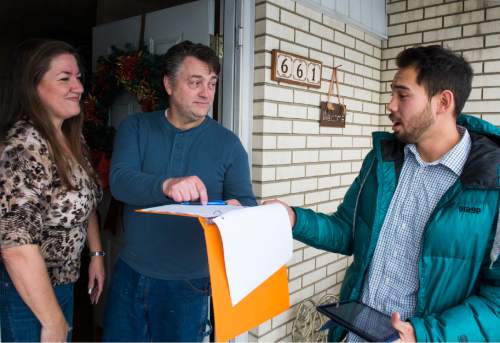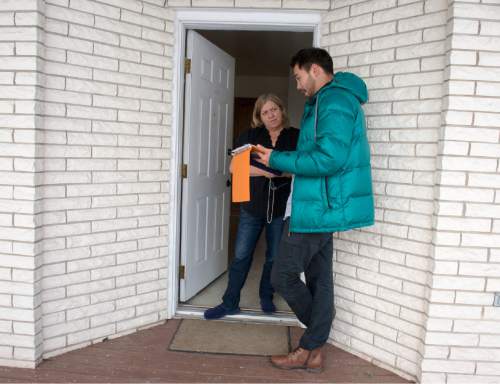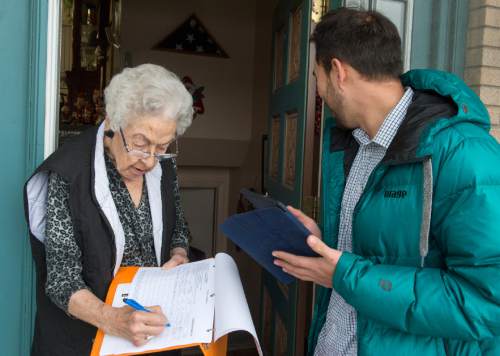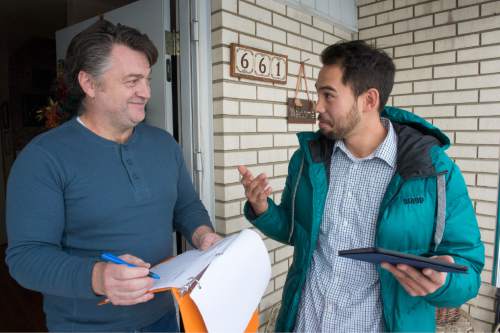This is an archived article that was published on sltrib.com in 2016, and information in the article may be outdated. It is provided only for personal research purposes and may not be reprinted.
Provo • With an orange binder in one hand and a digital tablet in the other, Tanner Leatham walks to the first house on the corner. The purple pin on the map turns green, telling him he's standing in front of the home of Gavin and Sharilyn Grooms, registered Republicans in Sen. Curt Bramble's Provo district.
Gavin Grooms answers the door, and Leatham explains he's helping Bramble gather the 2,000 signatures from registered Republican voters that the senator needs to get on the Republican primary ballot under SB54.
"This doesn't mean you have to vote for him. It just means you're OK having him on the ballot," Leatham explains.
Grooms, a Republican delegate, agrees to sign the petition and calls his wife, Sharilyn, to the door to sign.
"Curt Bramble is our buddy," she says, writing her name in the petition in the orange binder. "Tell him to come over."
After years of wrangling over how to reform Utah's elections — from an aborted initiative drive by a group of well-heeled politicos calling themselves Count My Vote, to the legislative compromise of SB54, to court battles past and future — this is where the shoe leather hit the sidewalk, as Leatham and signature gatherers like him took to the streets to begin gathering petition signatures.
On Monday, 38 candidates filed to collect signatures to run for state offices, and more will continue to file and gather signatures in the coming weeks.
In less than a half-hour, Leatham knocks on six doors. Five are answered and yield eight signatures.
"I'm 91 years old," said Connie Swensen, standing in her doorway.
"That's awesome," said the cheerful Leatham.
"It is?" Swensen says, giving the man on the doorstep a sideways look. "You should try it."
Leatham is co-founder of the company Gather. On Monday, the first day to collect signatures, he had 80 people knocking on doors, mainly in two Senate districts: Bramble's and Woods Cross Sen. Todd Weiler's.
He estimates that between two and four days, his teams can round up the signatures needed — 2,000 for a state Senate seat, 1,000 for a state House seat — to get a candidate on the ballot.
Gather is one of several options popping up for candidates who want to pursue the signature-gathering route to get on the primary ballot under SB54.
Last month, three options for gathering signatures were presented to Republican legislators in caucus meetings.
The Utah Association of Realtors is offering to let candidates use a mobile app that will list the party affiliations of residents at a specific address so signature gatherers can target voters. The third is a company co-founded by Taylorsville Republican Rep. Johnny Anderson, which uses phone banks to call registered voters and set up a time to knock on their doors and collect signatures.
Chris Kyler, executive director of the Utah Association of Realtors, said the app his group offers tracks the voter registration file and lets a candidate keep track of which doors have been knocked on and who has signed the petitions.
The idea is that candidates can send out volunteers — or Boy Scout troops or cheerleader squads looking for a fundraising opportunity — with the app to round up the signatures they need.
The Realtors — among the most politically influential groups at Utah's Capitol — are letting incumbents use the app free of charge. Kyler said they have not decided whether to give the same privilege to challengers or candidates for open seats.
In addition, there is a handful of other companies that have specialized for years in gathering signatures.
The cost of collecting signatures varies. Gather, for example, charges $6 for each valid signature raised — and under the law, professional signature gatherers can be paid only for signatures validated by the lieutenant governor's office.
But Gather gives a break if it is collecting signatures for multiple races in the same neighborhoods, knocking off a dollar, for example, if it can collect signatures in an overlapping House and Senate race by knocking on the same door, or $2 if you add in a countywide race.
Other groups charge more, but that means that a state Senate candidate who goes the signature route can expect to spend at least $12,000, while House candidates would be in to the tune of $6,000 or more for a spot on the primary ballot.
On the Republican side, candidates presumably will still be going through the party's nominating convention because Utah GOP Chairman James Evans has said the party plans to contest the candidacy of any Republican who tries to get a primary spot by gathering signatures but fails to go to the party's convention and get 40 percent of the support from delegates — the threshold to get into a primary through the convention route.
The state elections office has said it would put anyone who gathers enough signatures on the ballot, creating a dispute between the party and elections officials that both sides are planning to ask the Utah Supreme Court to resolve.
Of the 38 who filed to gather signatures Monday, 37 are Republicans. The only exception is Vaughn Cook, who filed as a Democratic candidate for governor. One Republican, Chia-Chi Teng, filed to run for Congress against Rep. Jason Chaffetz. Nine Republicans filed to run for Senate, and 27 filed for state House bids.
For now, the signature gathering continues.
Leatham learned the door-to-door trade by selling alarms in different states over six or seven years. In 2012, he was working in Vermont and getting ready to return to school when a friend who was working on the Mitt Romney campaign asked him to help.
Leatham worked on Romney's advance team — orchestrating logistics for campaign events — when the owner of the alarm company he was working for called him and said he wanted to bring out a group of salesmen to knock on doors.
They were sent out to register voters in Ohio who had typically voted but were not registered, or who had voted Republican before but supported Obama in 2008. The teams hit the ground on the first day, basically armed only with pencils and forms, and registered more than had been registered in the previous four years.
"We got a phone call, and they said, 'Hey, are these numbers right?' " Leatham said. They were subsequently deployed to two more counties in Ohio that Leatham said they helped flip from Democratic blue to Republican red in the 2012 election.
So with 2016 approaching, Leatham thought of turning it into a business, having discussions with the national Republican Party and some political action committees about hiring his sales team.
"[We] realized that we had a good thing going and have a lot of talent in the door-to-door industry in Utah," he said. "All these guys know how to talk to people on the doors. They're very well-educated. Almost all of them speak two or more languages. Almost all of them are college graduates."
It was Spencer Stokes, a well-connected Republican lobbyist in Utah, who suggested Leatham get involved in gathering signatures in Utah. Stokes now owns part of the business and consults with Leatham, along with Casey Hill, a lobbyist for EnergySolutions.
So far, Leatham says Gather has signed up between 15 and 20 candidates and has as many as 20 more who are thinking of hiring the company, but there is some unease because of the charged politics and uncertainty surrounding SB54.
He expects more will come around when candidates realize how hard it is to gather the signatures.
Leatham's aspiration is to use Utah as a proving ground to show what his team can do and then take the company to the national level.
"A lot of these guys in Utah, because of religious background, speak Spanish, so we can go to states and say, 'I've got 30 professional guys who speak Spanish, and we can go register Latino voters,' " Leatham said. "We want to prove ourselves here and make some money along the way … build our reputation and take this to the national level where we can have a big influence in key swing states."
Twitter: @RobertGehrke









